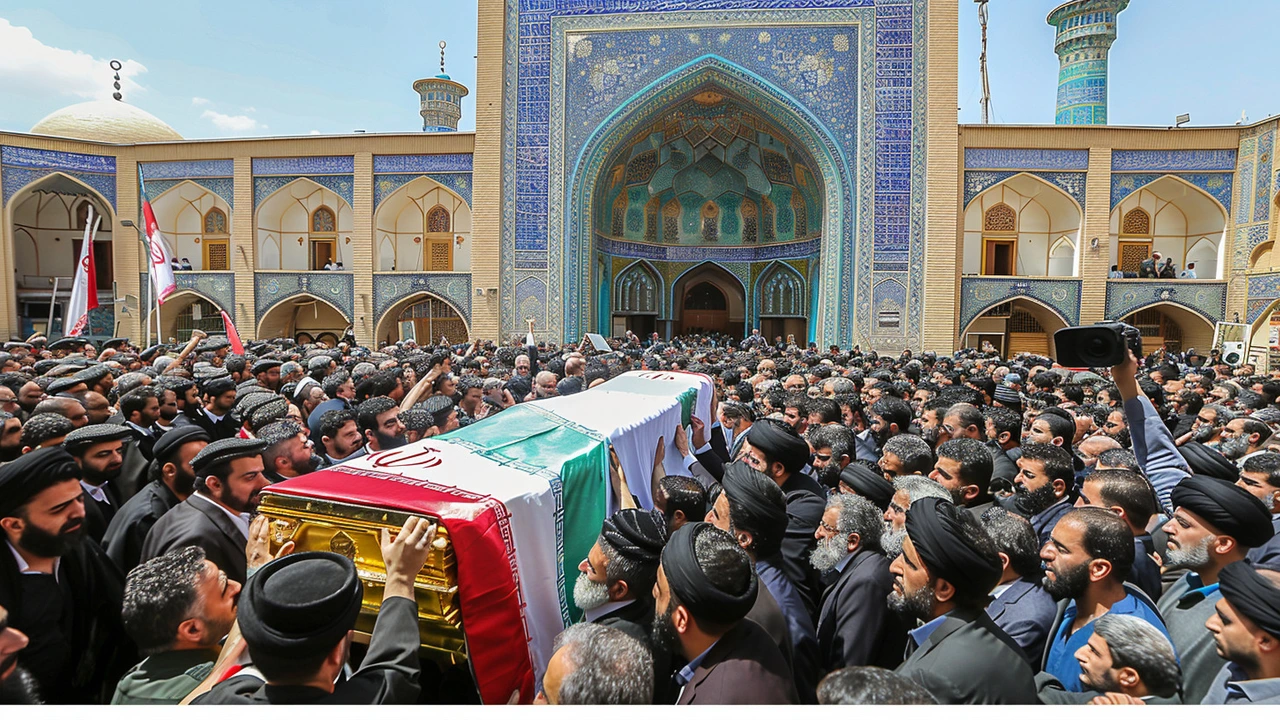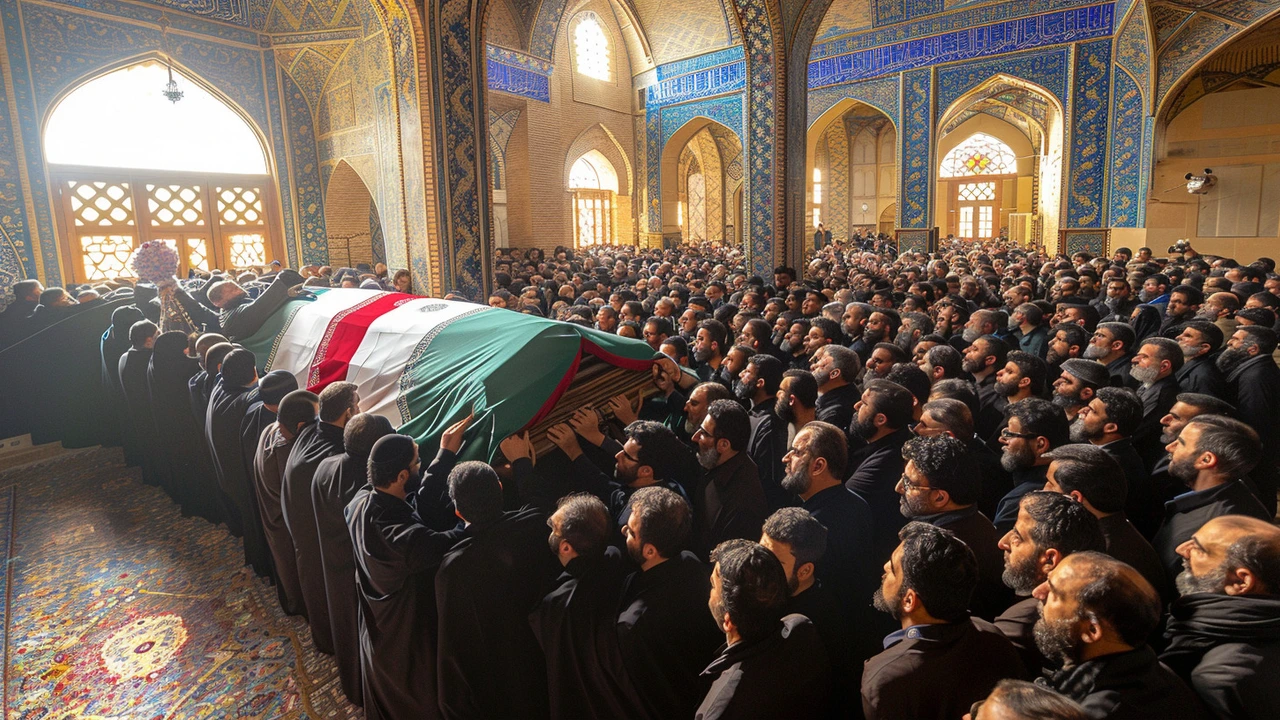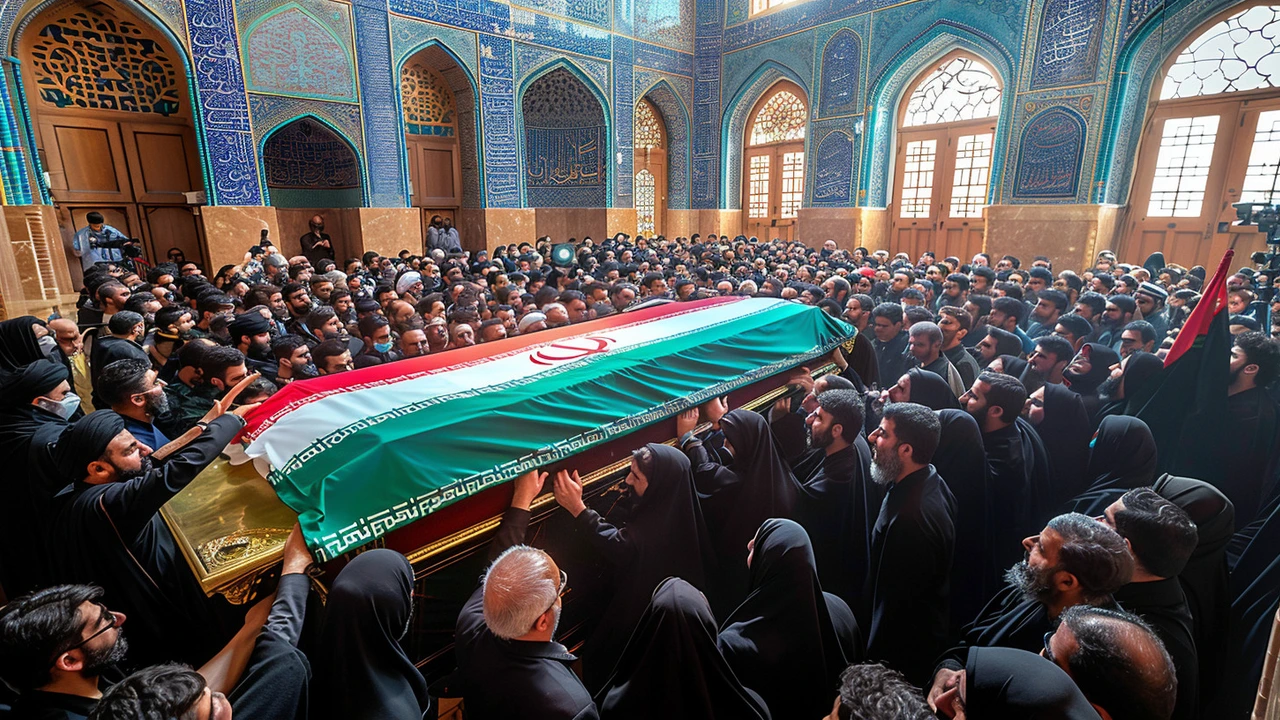Tragedy Strikes as Nation Loses Its Leader
Iran was thrust into a state of profound grief as news of President Ebrahim Raisi's untimely death emerged. The tragic helicopter accident, which occurred near the border with Azerbaijan, left the nation in shock. President Raisi, a significant political figure, had been a symbol of resolve and a beacon of hope for many within the country. The unfortunate crash also resulted in the deaths of Foreign Minister Hossein Amirabdollahian and six other key individuals, further deepening the mournful atmosphere enveloping Iran.
The initial details regarding the accident suggest a tragic series of unforeseen events. The helicopter carrying the President and his close aides encountered severe mechanical difficulties, leading to the catastrophic incident. The border region with Azerbaijan, known for its rugged and challenging terrain, posed additional complications to rescue efforts. Immediate reactions from the government and public alike have been that of sorrow and solidarity, showcasing the unity and strength of the Iranian populace even in the face of such a significant loss.

Funeral Procession: A Nation's Sorrowful Farewell
The funeral rites for President Raisi commenced in Tehran, with thousands of mourners gathering to pay their respects. The atmosphere in the capital was somber yet respectful, as citizens from various walks of life joined to honor their departed leader. The extensive procession, overseen by military and state officials, was marked by solemn silence, with many weeping openly as they reflected on the President's contributions and the void his passing leaves.
The journey of the funeral procession from Tehran to Raisi's birthplace, Mashhad, was marked by similar scenes of deep sorrow. The streets were lined with individuals holding photographs of the late President, displaying an outpouring of grief and reverence. In Mashhad, the final leg of the procession, a series of memorial services were held, highlighting the President's lasting impact on the people and the nation he served. The funeral's conclusion in Mashhad symbolized a return to his roots, allowing fellow residents to say their final goodbyes.

National Impact and Global Reactions
The death of President Raisi has had immediate and profound implications for Iran's political landscape. The nation now faces a period of transition as it contemplates the future without its elected leader. Interim measures are in place, with Vice President taking over presidential duties temporarily. The government's primary focus is ensuring stability and continuity during this challenging period, providing reassurance to both its citizens and the international community.Global leaders and dignitaries have expressed their condolences and support for Iran during this time of mourning. Messages of sympathy and solidarity have poured in from various countries, emphasizing the late President's role on the global stage. President Raisi's tenure was marked by significant diplomatic engagements, and his absence will undeniably be felt beyond Iran's borders.
Public Grief and Remembrance
Across Iran, public gatherings and memorials have sprung up as citizens come together to mourn and remember their President. Schools, businesses, and places of worship have observed moments of silence, reflecting the collective grief that has gripped the nation. In local communities, storytelling sessions and vigils are being held, focusing on President Raisi's achievements, his visions for Iran, and the legacy he leaves behind.
Many Iranians see President Raisi's untimely demise as not just a loss of a political figure, but as a personal tragedy as well. His life, filled with moments of public service and dedication to the country's development, resonates deeply with the populace. Even in smaller towns and remote villages, the impact of his loss is palpable, showcasing the widespread respect and admiration he had garnered throughout his career.
A Visionary Leader's Legacy
President Ebrahim Raisi's legacy is marked by his efforts to steer Iran towards economic self-sufficiency, foster social justice, and promote national unity. Under his leadership, numerous initiatives were launched aimed at reducing poverty, enhancing education, and improving healthcare systems. Raisi's vision often focused on uplifting the underprivileged and ensuring equitable development across various regions of Iran.
His foreign policy was meticulously crafted to safeguard national interests while fostering international cooperation. His tenure saw active engagement with neighboring countries and a staunch stance on protecting Iran's sovereignty. As the nation moves forward, these policies and initiatives will undoubtedly shape the narrative, continuing to guide Iran through the challenges ahead.
The mourning period serves not only as a time of reflection but also as a catalyst for unity. President Raisi's passing has brought forth a renewed sense of collective solidarity, with many citizens vowing to uphold the principles he championed. The way forward may be fraught with challenges, but the spirit of resilience, deeply ingrained in Iran's history, is sure to persevere.







16 Comments
Loss of a leader reminds us of impermanence. It also offers a chance to reflect on values without excess.
We have witnessed a strategic vacuum that could destabilize regional power dynamics. The regime's infrastructure must adapt swiftly or face systemic failure.
Honestly the narrative is a constructed spectacle to distract from internal corruption. Their so‑called unity is nothing more than a façade fed by propaganda.
Man the streets were packed with faces full of grief and pride it felt like a living mural of devotion and sorrow
its really heartwrenching but also shows how strong the community can be together we can get through this
Feeling the weight of this moment 😔 but also hopeful that the people will keep pushing for progress 😊
My thoughts are with the families and the nation during this somber period
For anyone looking for official statements check the Ministry’s website https://www.president.ir 📄 It’s updated daily
Oh great another grand funeral tour, because what the world really needed was more televised mourning
What a mess.
The demise of President Raisi marks a pivotal juncture in Iran’s contemporary political tapestry. Historically, the sudden loss of a head of state precipitates a cascade of institutional recalibrations. In this case, the vacuum is amplified by the concurrent demise of key cabinet figures, creating a multi‑layered succession dilemma. The constitutional provisions dictate that the Vice President assumes interim responsibilities, yet the practical execution of authority remains ambiguous. Domestic factions will likely vie for influence, leveraging both ideological leanings and regional loyalties. Moreover, the military’s role could expand, as security apparatuses seek to preserve order amid potential unrest. Economic policies, already strained by sanctions, may face abrupt redirection depending on the interim leadership’s orientation. Internationally, allies and adversaries alike will monitor the transition, interpreting subtle cues as indicators of future foreign policy. The United States and European states may use the period to press for diplomatic concessions, while regional powers like Russia and China might aim to solidify strategic partnerships. Public sentiment, as evidenced by massive funeral attendance, underscores a complex blend of mourning and political mobilization. Social media narratives are oscillating between genuine grief and orchestrated propaganda. Academic observers note that such moments can catalyze either reformist momentum or authoritarian consolidation. The upcoming election timeline will be crucial, determining whether systemic change is feasible. Civil society groups are already organizing forums to discuss governance reforms, though their freedom remains constrained. In sum, Iran stands at a crossroads where the interplay of constitutional mechanisms, power broker ambitions, and external pressures will shape its trajectory for years to come.
While your exposition is exhaustive, it glosses over the fact that the elite’s grip is far more entrenched than you concede. The power corridors operate on patronage, not constitutional nuance.
Dear colleague, your fervor, though commendable, neglects the solemnity of national tragedy. Let us balance critique with respect for the departed and the collective grief that binds the populace.
I appreciate both perspectives and hope dialogue remains constructive. Healing begins when we listen as much as we argue.
Indeed listening is key yet often ignored by those chasing power.
Perhaps the real contrarian stance is to recognize that power dynamics and genuine mourning can coexist without negating each other.